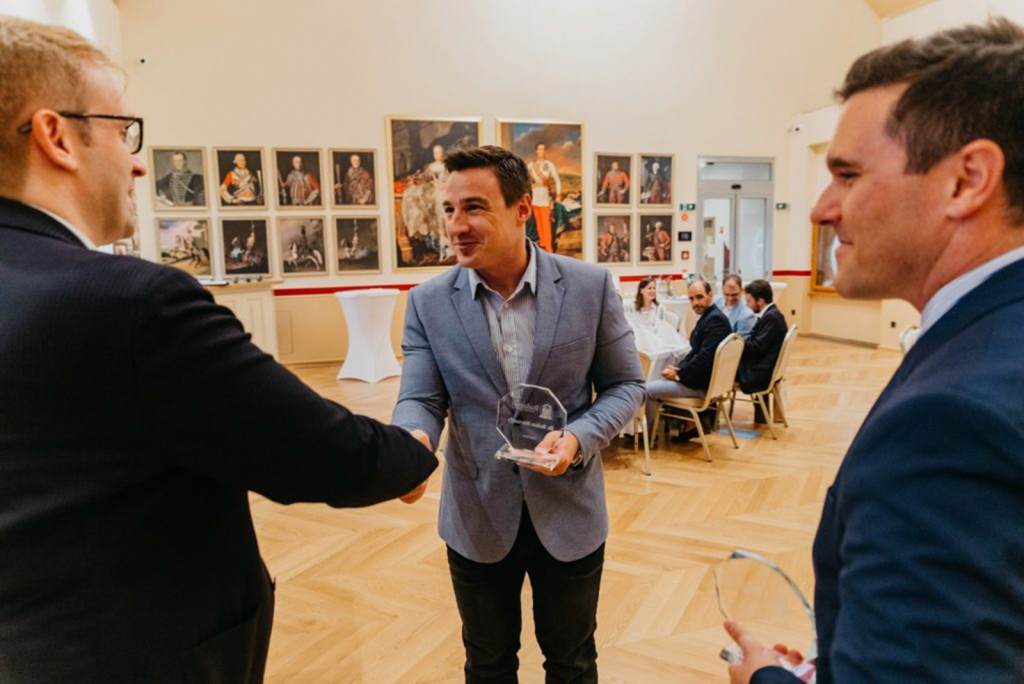I am a political scientist who deals with international security issues. This is how Balázs Mártonffy defines his professional identity. As head of the NKE Institute for American Studies, he often reflects on other major world issues in addition to teaching and researching security policy and research methodology. Portrait.
In addition to professional considerations, the head of the Institute for American Studies, who will take up work this year, has family ties to the Ludovika University of Public Service and its predecessor. “I share this institution’s ethos of combining science and public service,” says the 34-year-old, whose great-great-grandfather was Konrád Siegler, former commander of the Ludovika Academy.
A child with purpose
He grew up in Budakeszi, the child of an architect father and an English teacher mother. From a very young age he read a lot; he always had a book in his hand and was sometimes mocked for it. It’s not often that you get your information from the International Herald Tribune at the age of 13, but Balázs Mártonffy liked the European edition of the New York Times because it “captured the differences in outlook between American and European attitudes to life”. He was also interested in military fighting vehicles, tanks, aircraft and similar boyish things. And of course, history, especially the Roman era, wars and weapons.
He started his education in a Christian, English-language American private school, but also attended a French school because he became interested in the language at the age of 13. And since there was democracy in the family, his parents allowed and supported him. He also learned German relatively early on, but it was clear that he was to continue with English. “I was characterised by a sense of purpose as a child,” he says, explaining why it was a no-brainer to apply for several US university scholarships after high school. That’s how he got to the history department of Washington University in St. Louis, at the age of 18.
“It’s a lifestyle logic”
The time spent abroad at university not only provided important knowledge, but also a “consolidation of attitudes”. It was here that Balázs Mártonffy really learned how to work efficiently, and the concept and practice of compartmentalisation became part of his everyday life. He defines this logic of living for himself in this way: “We pay attention to the values that directly motivate human life, the interests that indirectly influence it, and the value generation that goes beyond these and can determine the vision of society”. And why is this important? Because all of this gives you a complete picture of how to spend your time, broken down into weeks.
His years in the US also taught him the methods of effective prioritisation. “You think about what goes in which ‘box’, what size each ‘box’ is, and how they build on each other. It’s a logic of thinking and living that I also learned to articulate and integrate effectively at university”. He is a stranger to procrastination; he either works or relaxes: if you have a task, you have to break it down and get on with it, he believes. Outside, they say work hard, play hard – a concept Balázs Mártonffy has translated into his own life as “work smart, play smart”.

Analysis paralysis
While completing his undergraduate degree in history, he also spent a year of internship at a European security think tank in Brussels. It was there that he became really interested in security policy, and after one year he applied for a master’s course in security policy at the University of Denver, where he also worked as a research assistant. From there, his path led to the International Secretariat of NATO as a Defence Policy Intern. Here, and in his subsequent position as NATO adviser to the Ministry of Defence, he was amazed at the differences in views, the realities he experienced, and how a consensus solution could still be found at the alliance level from time to time. It was then that he realised that he also wanted to research this topic.
He applied for doctoral training. “You can assess the priorities on which a country acts and makes decisions, but I am interested in how an international alliance such as NATO, where decisions are made on the basis of consensus, makes them. Why is it that in some cases the North Atlantic Council was able to reach consensus, and in others not? After all, the players are the same, and the national interests are firm. I wrote the answer, based on my research, in my paper ‘Analysis paralysis’. The essence of it is the difference between the assessments of each threat;, that is to say, in a very simplified manner, whether the threat is specific or general”. He was awarded the John McCain Prize last year for his work and research.
Beyond the professorship
Balázs Mártonffy enjoys not only learning and researching, but also teaching. In this capacity, he also won an award at the American University based on student reviews. He says his students rewarded him for his ability to convey conceptual thinking. “The student thinks about the world in one way. I break it down into parts and explain that other parts make up a different way of thinking, meaning that there are other ways of explaining the world. I think they also appreciated the fact that I was able to give them very complicated formulas in a clear way. I explained the realist mindset, for example, on the basis of Game of Thrones”.
Balázs Mártonffy’s classes also, one hopes, provided students with impulses, ideas and approaches beyond the classroom, and a mentor-mentee relationship developed later with several of his students. He says it’s worth analysing other life choices and understanding your own and other people’s motivations.
In the summer of 2019, after 15 years abroad, he and his wife moved back home from Washington. Since then, he has worked as Deputy Head of the Security Policy Department of the Ministry of Foreign Affairs and Trade, while teaching at the Department of Security Studies at the NKE and as a non-resident research fellow at the International Center for Security and Leadership. He had to learn time management in the context of leadership, and the issue of team building was also new to him, as research is an individual activity and responsibility. In the middle management position, it was a challenge to establish ownership, in other words, to make subordinates feel ownership of their role, their organisation, and pride in being part of the big picture.
“I am an efficient person, perhaps over-emphasising efficiency, thinking in tasks and matrices, but you have to allow time, to understand the other person’s view of life and find the place they like in light of it. This is a different logic from a researcher’s identity, and it needs to be addressed”. Finally, he was helped by past memories: recalling the time when he was on the other side and experienced how differently his managers had looked at these aspects.
Although he is only 34, he has already worked in numerous fields and positions. When it comes to career development, he stresses the importance of awareness, as a prescription for young people. “Working every day for long-term gains and enjoying the small pleasures of life: a good balance between these two is to be found.”
Névjegy
Balázs Mártonffy
Place and date of birth: Budapest, 07.06.1987
Qualifications: PhD in political sciences, international relations expert (American University), security policy expert (University of Denver), historian (Washington University in St. Louis)
Research interests: alliance cohesion, security policy, NATO, United States
Publications: Balázs Mártonffy’s profile in the Hungarian Archives of Scientific Works
Marital status: married Hobbies: tennis, squash, skiing


